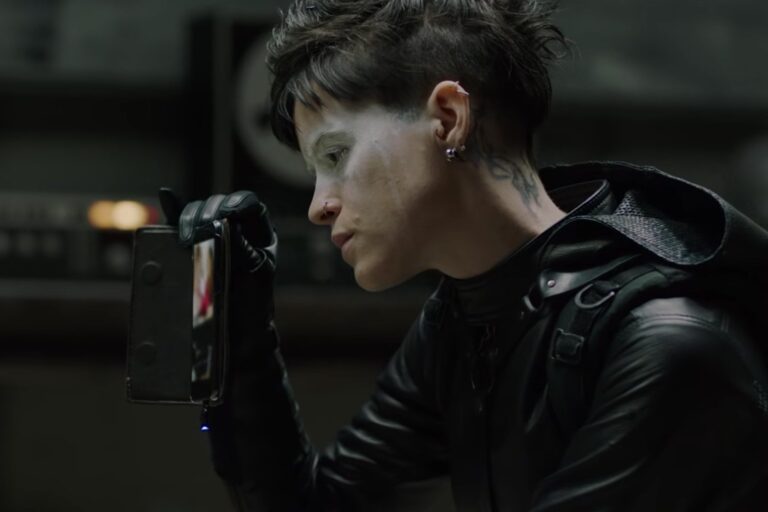It’s a shame that David Fincher never had the opportunity to continue the story of Lisbeth Salander after his excellent remake of The Girl with The Dragon Tattoo, with plans for a pair of sequels (based, like the first, on the trilogy of novels by late Swedish author Stieg Larsson) never coming to fruition. And although The Girl in the Spider’s Web: A New Dragon Tattoo story names Fincher as an executive producer, neither the characters nor the world they inhabit bear much resemblance to their previous incarnations.
A few years have passed since the events of Fincher’s film, and reclusive hacker Salander (Claire Foy) has practically become a superhero: clad in a hooded vinyl coat and fearsome white face paint, we find her infiltrating the apartment of a wealthy businessman recently acquitted of sexual assault, and fresh from dishing out a beating to his wife. Stringing him up by his feet and jolting his genitals with a stun gun before cleaning out his bank account, Lisbeth makes it clear that his days of abusing women are behind him.
As she speeds away through snow-covered streets on her motorcycle, we get the sense this sort of thing has become rote for Lisbeth. Indeed, when she’s contacted about a new hacking job, she leaps at the opportunity for a new challenge, and this one is a doozy: she’s tasked with hacking into the NSA and stealing a sophisticated missile-control program developed by a twitchy programmer (Stephen Merchant) having a crisis of conscience. But the job, which Lisbeth pulls off with seemingly little effort, puts her squarely in the sights of a mysterious Russian crime syndicate called The Spiders, as well as a pissed-off NSA agent (Lakeith Stanfield) who travels to Stockholm to retrieve the files.
The Girl in the Spider’s Web is hardly concerned with developing its characters, perhaps expecting audiences to already be familiar with Lisbeth and her former lover, investigative journalist Mikael Blomkvist (Sverrir Gudnason, dashingly handsome and woefully adept at capturing either the dogged determination or the world-weariness of Daniel Craig’s portrayal). The labyrinthine script, with its endless array of twists, turns and flashbacks, also fails to adequately flesh out Stanfield’s jack-of-all-trades agent – there’s a throwaway line about him being an elite hacker called “Warchild” before going to work for the government, but that still doesn’t explain his expertise with a high-powered sniper rifle, nor his personal investment in recapturing the stolen data.

The film’s primary antagonist, Lisbeth’s estranged sister Camilla (Sylvia Hoeks), is equally enigmatic. Her motivation for wanting her sister dead has something to do with the abuse suffered at the hands of their father, with whom she chose to remain when Lisbeth finally fled their childhood home, but it’s never clear why she blames Lisbeth for this choice. There’s also the question of why Camilla, who apparently leads a formidable shadow organization with a hefty supply of henchman, has waited so long to exact her revenge, or why she goes to such elaborate lengths to frame Lisbeth for murder if she fully intends to kill her.
But The Girl in the Spider’s Web doesn’t care about these things: basically, we know Camilla is evil because she dresses like a Bond villain – which is fitting, since director Fede Alvarez seems to be heavily influenced by some of the more recent Bond films. From the film’s intricately designed action sequences to Lisbeth’s advanced technical prowess and near indestructibility, to its focus on events of the past coming back to haunt us, it’s clear that Alvarez really wanted to make a spy thriller in the vein of Skyfall or The Bourne Identity. And while he might have been able to pull off such an endeavor under different circumstances, that sort of template is a very poor fit for this girl and her dragon tattoo, misfiring in spite of a spirited performance by Foy.

